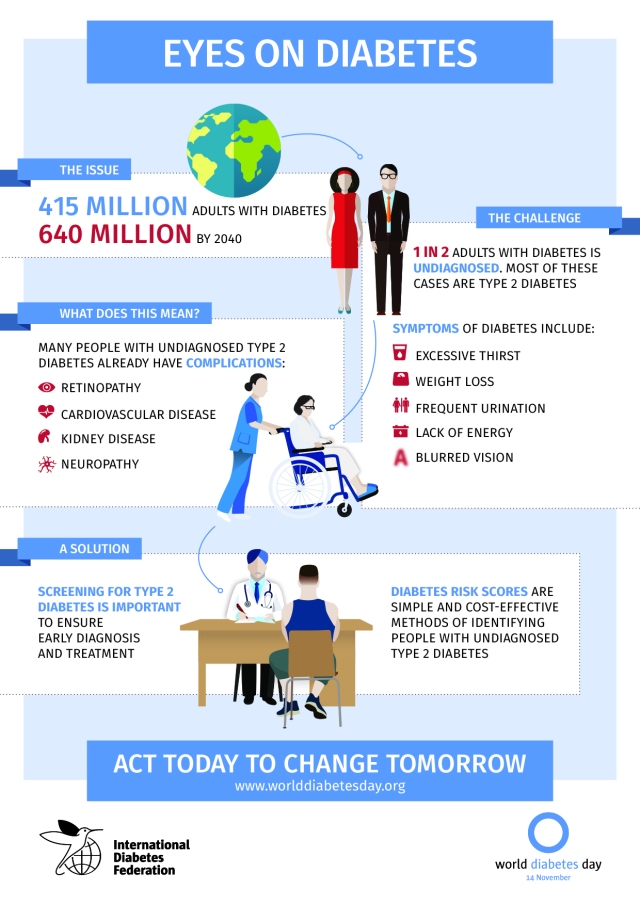By Professor Desmond Johnston, Vice Dean (Education) for the Faculty of Medicine at Imperial College London
 The prevalence of diabetes has increased dramatically in recent years and in some countries this is still occurring. The increase applies mainly to type 2 diabetes but there are indications that the prevalence of type 1 diabetes is also rising. Diabetes of either type has major personal and societal implications, being associated with an inevitable requirement for some modification of lifestyle, living in the shadow of serious complications such as circulatory disorders and disease of the eyes and kidneys, and ultimately reduced life expectancy. The consequences are especially severe in low income countries where the costs associated with having diabetes can have major implications for personal and family finances.
The prevalence of diabetes has increased dramatically in recent years and in some countries this is still occurring. The increase applies mainly to type 2 diabetes but there are indications that the prevalence of type 1 diabetes is also rising. Diabetes of either type has major personal and societal implications, being associated with an inevitable requirement for some modification of lifestyle, living in the shadow of serious complications such as circulatory disorders and disease of the eyes and kidneys, and ultimately reduced life expectancy. The consequences are especially severe in low income countries where the costs associated with having diabetes can have major implications for personal and family finances.
Much can be done already to limit the damage caused by diabetes, individually and at a societal level, but more research is needed. Type 2 diabetes occurs most commonly in people who are overweight and who take little physical activity. People at high risk of developing type 2 diabetes can be identified in the population with risk scores and/or a simple blood test, and in some countries this is now underway in a systematic fashion. We know from randomised controlled trials that type 2 diabetes can be prevented or delayed in many high risk people by lifestyle modification (diet and physical activity) but more research is needed to define the most cost effective methods of extrapolating the benefits which have been observed in the clinical trials to the wider population. It is likely that technology will play a role, enabling education in lifestyle modification and encouragement to be delivered at low cost to large numbers of people. In people with established type 2 diabetes, advances in the understanding of an individual’s response to specific treatments should improve outcomes (‘personalised medicine’) but much research is needed in this area. Prevention of type 1 diabetes is more problematic but also an area of much research. Some of the risk factors for type 1 diabetes have been identified and potential interventions to reduce its incidence are being explored. For people who have already developed type 1 diabetes, new methods of insulin delivery and glucose control are being explored. Interventions which limit or delay the loss of insulin-secreting beta cells could have long-term benefit and this is another major type 1 diabetes research area. For people with diabetes of any kind, the prevention of complications remains a challenge. We know that effective treatment of high glucose, blood pressure and lipid levels helps but more research is needed.
In people with established type 2 diabetes, advances in the understanding of an individual’s response to specific treatments should improve outcomes (‘personalised medicine’) but much research is needed in this area. Prevention of type 1 diabetes is more problematic but also an area of much research. Some of the risk factors for type 1 diabetes have been identified and potential interventions to reduce its incidence are being explored. For people who have already developed type 1 diabetes, new methods of insulin delivery and glucose control are being explored. Interventions which limit or delay the loss of insulin-secreting beta cells could have long-term benefit and this is another major type 1 diabetes research area. For people with diabetes of any kind, the prevention of complications remains a challenge. We know that effective treatment of high glucose, blood pressure and lipid levels helps but more research is needed.
Although huge progress has been made in diabetes prevention and management in recent years, much remains to be achieved through high quality research and implementation programmes.